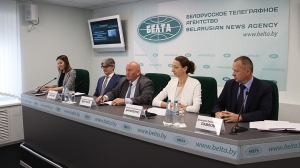Ru
|
Eng
Belarus to present nuclear waste management report at IAEA meeting
14.06.2022

MINSK, 14 June (BelTA) – Belarus will present a national report at a review meeting of the contracting parties to the Joint Convention on the Safety of Spent Fuel Management and on the Safety of Radioactive Waste Management. The review meeting will begin in Vienna, Austria on 27 June. Deputy Head of the Nuclear and Radiation Safety Department of the Belarusian Emergencies Ministry (Gosatomnadzor) Aleksandr Dokuchayev mentioned it at a media briefing held in BelTA’s press center to discuss new trends in the global nuclear safety regime for Belarus.
Aleksandr Dokuchayev said: “We will soon have to defend a national report on the Joint Convention on the Safety of Spent Fuel Management and on the Safety of Radioactive Waste Management. The review meeting will begin at International Atomic Energy Agency (IAEA) venues in two weeks, as from 27 June.”
During the review meeting the parties will get an opportunity to present and discuss their national reports, review the measures they have taken in order to honor their commitments in accordance with the joint convention, and determine the areas where progress has been made in addition to determining the best practices and tasks.
In addition to the abovementioned joint convention Belarus is also party to the Convention on Nuclear Safety. “It goes like this. The country carries out a self-evaluation and compiles a national report, which other countries can access and study thanks to the IAEA. In turn, we study reports of other countries, exchange opinions, and then national reports are defended at an IAEA venue. The work reveals both positive aspects and those that need to be addressed. The work is aimed at enhancing the safety of individual countries and other countries and represents the foundation of the global nuclear safety regime,” the official explained.
In his words, due to the pandemic Belarus did not have the chance to defend its national report within the framework of the Convention on Nuclear Safety three years ago. “We are now upgrading our report. Instead of three years it will cover a period of six years – from 2017 through 2022,” Aleksandr Dokuchayev added.
NEWSWIRE
17.07.2024
02.07.2024
27.06.2024
21.06.2024
19.06.2024
06.06.2024
06.06.2024
06.06.2024
06.06.2024
06.06.2024













